

Why You Should Embrace Surveillance, Not Fight It. Image: Twentieth Century Fox & Dreamworks I once worked with Steven Spielberg on the development of Minority Report, derived from the short story by Philip K.
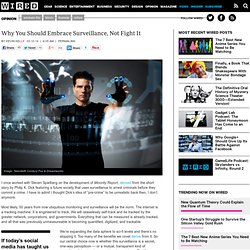
Dick featuring a future society that uses surveillance to arrest criminals before they commit a crime. I have to admit I thought Dick’s idea of “pre-crime” to be unrealistic back then. I don’t anymore. Most likely, 50 years from now ubiquitous monitoring and surveillance will be the norm. If today’s social media has taught us anything about ourselves as a species it is that the human impulse to share trumps the human impulse for privacy. We’re expanding the data sphere to sci-fi levels and there’s no stopping it.
We can see both scenarios beginning today. The remedy for over-secrecy is to think in terms of coveillance, so that we make tracking and monitoring as symmetrical — and transparent — as possible. Kevin Kelly is Senior Maverick at WIRED. Bitcoin generates ‘public privacy’, so to speak. Zappos Says Hackers Accessed 24 Million Customers' Account Details. Adobe Breach Impacted At Least 38 Million Users. The recent data breach at Adobe that exposed user account information and prompted a flurry of password reset emails impacted at least 38 million users, the company now says.
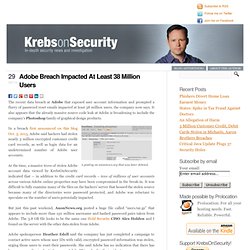
It also appears that the already massive source code leak at Adobe is broadening to include the company’s Photoshop family of graphical design products. A posting on anonnews.org that was later deleted. In a breach first announced on this blog Oct. 3, 2013, Adobe said hackers had stolen nearly 3 million encrypted customer credit card records, as well as login data for an undetermined number of Adobe user accounts. At the time, a massive trove of stolen Adobe account data viewed by KrebsOnSecurity indicated that — in addition to the credit card records – tens of millions of user accounts across various Adobe online properties may have been compromised in the break-in. Part of the Adobe breach involved the theft of source code for Adobe Acrobat and Reader, as well as its ColdFusion Web application platform. 3 million bank accounts hacked in Iran. Update - Google kills Iranian blog with 3 million hacked bank accounts After finding a security vulnerability in Iran's banking system, Khosrow Zarefarid wrote a formal report and sent it to the CEOs of all the affected banks across the country.
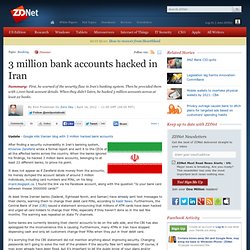
When the banks ignored his findings, he hacked 3 million bank accounts, belonging to at least 22 different banks, to prove his point. It does not appear as if Zarefarid stole money from the accounts; he merely dumped the account details of around 3 million individuals, including card numbers and PINs, on his blog: ircard.blogspot.ca. I found the link via his Facebook account, along with the question "Is your bank card between thease 3000000 cards? " Important Message from Facebook's White Hat Program. Sony Promises All PlayStation Services Will Return This Week (Again)
World's Biggest Data Breaches & Hacks. Let us know if we missed any big data breaches. » 70% of passwords are in this chart.
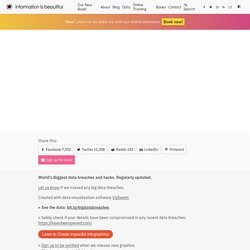
Hackers hit companies like Nasdaq, 7-Eleven for $300 million, prosecutors say. ERIC THAYER/Reuters/REUTERS Starting in 2007, malicious software, or malware, was placed on NASDQ’s computer network, resulting in the theft of log-in credentials.
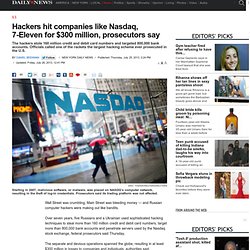
Prosecutors said its trading platform was not affected. Wall Street was crumbling, Main Street was bleeding money — and Russian computer hackers were making out like bandits. Over seven years, five Russians and a Ukrainian used sophisticated hacking techniques to steal more than 160 million credit and debit card numbers, target more than 800,000 bank accounts and penetrate servers used by the Nasdaq stock exchange, federal prosecutors said Thursday. The separate and devious operations spanned the globe, resulting in at least $300 million in losses to companies and individuals, authorities said. Officials called one of the rackets the largest hacking scheme ever prosecuted in the United States. U.S. credit card numbers sold for about $10 each, while Canadian numbers fetched $15 and European numbers earned $50. Facebook : les coordonnées de 6 millions d'internautes publiées. Une panne de logiciel au sein du réseau social Facebook a provoqué le partage involontaire des numéros de téléphone et des adresses courriels de 6 millions d'utilisateurs, a reconnu Facebook vendredi 21 juin.
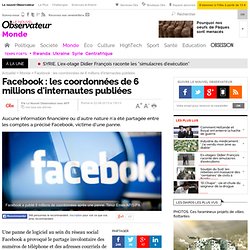
PRISM – Comment passer entre les mailles de la surveillance d’Internet ? Le moteur de recherche DuckDuckGo est le seul à proposer des requêtes anonymes.
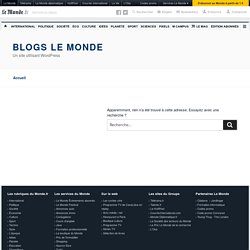
En réaction aux révélations sur le programme Prism, qui permet au gouvernement américain d’espionner les données personnelles des internautes grâce à la coopération de neuf géants du Web – Microsoft, Yahoo! , Google, Facebook, PalTalk, AOL, Skype, YouTube et Apple – un article de France TV Info explique point par point « comment sortir (presque) entièrement du prisme, quitte à sacrifier votre confort et vos habitudes ». >> Voir l’infographie : « Comprendre le programme ‘Prism' » Téléphone mobile : mieux vaut éviter les smartphones, dont le système d’exploitation est presque toujours fourni par Google (Android), Apple (iPhone) et Microsoft (Windows Phone). Mails : préférer à Gmail, Hotmail (Outlook), Yahoo! Navigateurs Internet : plutôt que Chrome (Google), Internet Explorer (Microsoft) et Safari (Apple), qui représentent tout de même 80 % du marché, opter pour Opera ou Firefox.
Booz Allen : du conseil en stratégie aux petits secrets du gouvernement américain. Le Monde.fr | • Mis à jour le | Par Mathilde Damgé "La plupart des systèmes que nous développons, intégrons ou gérons impliquent de protéger des informations liées au renseignement, à la sécurité nationale et à d'autres activités sensibles ou classsifiées du gouvernement.
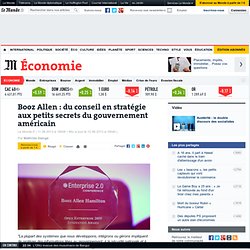
Une fuite dans l'un de ces systèmes pourrait porter un grave préjudice à notre activité, ainsi qu'à notre réputation, et nous empêcher de travailler à nouveau avec le gouvernement américain", note le formulaire d'enregistrement de Booz Allen Hamilton (BAH) auprès du gendarme de la Bourse américaine. La même société annonçait mardi 11 juin dans un communiqué qu'Edward Snowden, employé à Hawaï dans les trois derniers mois, avait été licencié la veille. Un opérateur téléphonique livre tous les relevés de ses abonnés aux renseignements américains.
Un nouveau scandale menace la Maison Blanche.
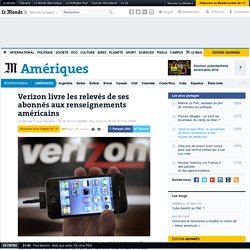
NE QUITTEZ PAS – Dix ans de prison pour déverrouiller un téléphone aux Etats-Unis. Le prix du déverrouillage : 500 000 dollars d'amende (REUTERS/Steve Marcus)
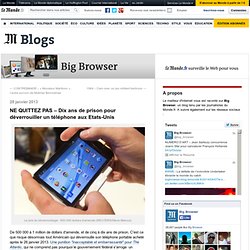
STIC et droit : défis, conflits et complémentarités. L'évolution des technologies de l'information a des répercussions considérables sur notre société. De nouveaux défis, mais aussi des conflits, ont émergé. Ces technologies soulèvent notamment de nombreuses questions inédites en termes de droit. Très différents, les deux mondes — juridique et informatique — doivent apprendre à coexister. Il est temps de réglementer la propriété dans les nuages. La CNIL.